| Supermob: | Source |
How does a lawyer with no phone, no office, and no files become one of the most powerful men in America?
 |
Acclaimed investigative reporter Gus Russo returns with his most extraordinary book yet, the remarkable story of the “Supermob” — a cadre of men who, over the course of decades, secretly influenced nearly every aspect of American society. Supermob presents stunning revelations about national icons such as Ronald Reagan, Jules Stein, Lew Wasserman, Paul Ziffren, Abe Pritzker, and others. Although most of these men were meticulously low profile, Supermob pulls the lid off of their half-century infiltration into American business, politics, and society. At the heart of it all was the Chicago Outfit's fair-haired boy, Sidney Korshak, a.k.a. "The Fixer," who from the 1940s until his death in 1996 was not only the most powerful lawyer in the world, according to the FBI, but also the enigmatic, almost vaporous player behind some of the shadiest deals of the twentieth century.
With the mob's vise grip over American labor, it was Korshak whom they designated to manage their investments: from the Outfit's hitherto undisclosed California land grabs (the real “Chinatown” story) to Hollywood quid pro quos, from casino monopolies to underhanded hotel deals. As the underworlds primary link to the corporate upperworld, Korshak 's backroom dominance and talent for anonymity remains unparalleled. Controversial, exhaustively researched, endlessly entertaining, and lavishly illustrated with many previously unseen photos, Supermob is a probing investigation into a little-known chapter of American history.
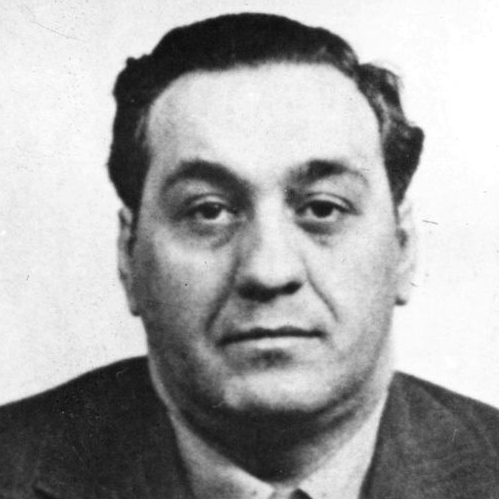 |
Antonino Leonardo Accardo (1906-1992)—aka “Tony,” “Joe Batters,” and “The Big Tuna.” Served as boss of Chicago's Outfit, the most powerful underworld cartel in U.S. history, for over six decades in the twentieth century. A major force in national bookmaking, labor racketeering, the Teamsters Pension Fund, and Las Vegas casino gambling, Accardo treated Sid Korshak like a son.
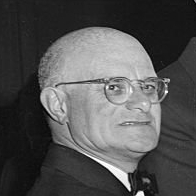 |
Jacob “Jake” (or “Jack”) Arvey (1895-1977)—Chicago-born attorney/political kingmaker who built one of the most powerful patronage “machines” in America. He served as a mentor to many of Chicago's most “well-connected” Jewish attorneys, and as a crucial vote deliverer for Democratic presidents such as FDR, Truman, and JFK. Key early supporter of the state of Israel.
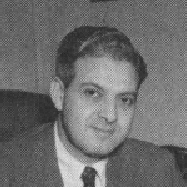 |
David Lionel Bazelon (1909-1993)—Chicago tax attorney, originally in law firm with college buddy Paul Ziffren, but left private practice to become Truman's assistant attorney general in charge of the lands division, a position that he used to his advantage in his own real estate investments. He quickly advanced to become director of the Office of Alien Property, where he oversaw the disbursement of land (often to his Chicago pals) seized from the Japanese Americans sent to internment camps during World War II. Eventually became a chief judge in D.C.'s Court of Appeals.
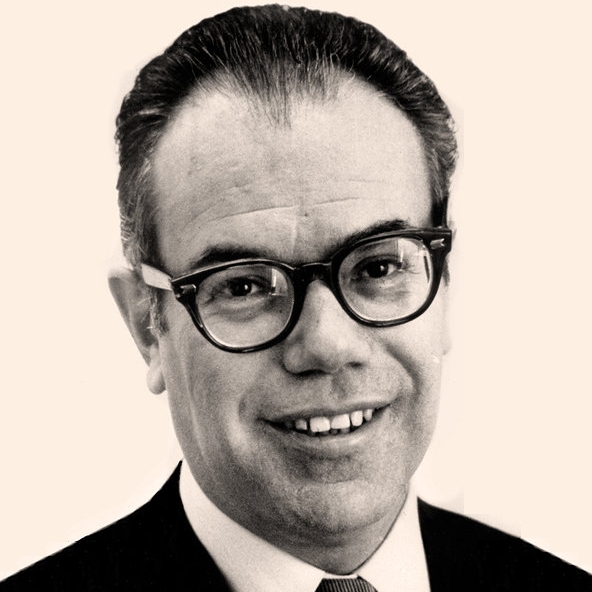 |
Charles Bluhdorn (1926-1983)—aka “The Mad Austrian.” Austrian immigrant who parlayed a successful auto parts distributorship into a conglomerate comprising over a hundred firms, all consolidated in 1958 when he formed Gulf & Western Inc. In 1966, Bluhdorn purchased struggling Paramount Pictures, named Sid Korshak's sycophant Bob Evans as production chief, then brought in the Mafia's Vatican money launderer Michele Sindona as a major “silent” investor in the movie studio. Bluhdorn utilized Sid Korshak's talents to oversee his Chicago racetracks' labor issues; invested in Korshak's mob retreat, The Acapulco Towers.
 |
Albert Romolo Broccoli (1909-1996)—aka “Cubby.” One of Sidney Korshak's closest Beverly Hills friends, and producer/owner of the James Bond movie franchise. When Broccoli produced Diamonds Are Forever in Las Vegas, Korshak was the “uncredited legal advisor,” donating both his Riviera Hotel and his girlfriend Jill St. John to the production.
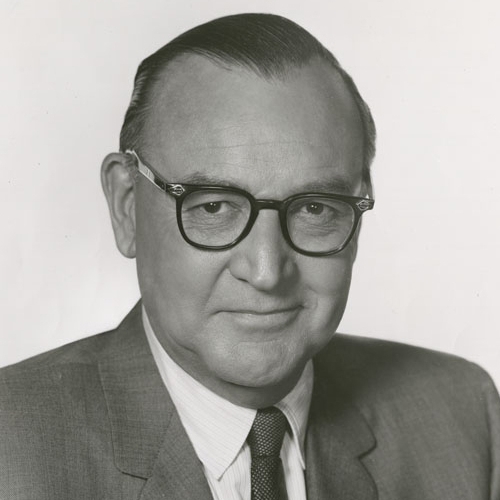 |
Edmund G. “Fat” Brown (1905-1996)—San Francisco-born attorney and respected governor of California (1959-67). Father of California governor Jerry Brown. Received important political and financial support early and often from Sid Korshak and friends. On board of directors of Bernie Corn-feld's Investors Overseas Services (IOS), which bilked investors out of hundreds of millions, before imploding after allegations of being a fraudulent pyramid scheme and money launderer for the mob. (Founder Cornfeld served eleven months in a Geneva jail, before charges were dropped, allowing him to move to Beverly Hills and date Heidi Fleiss.)
 |
Jerry Brown (Edmund G. Brown Jr.) (1938-)—aka “Governor Moonbeam.” Governor of California (1974-83) who received controversial labor support from Sid Korshak, allegedly in return for Brown's favored treatment of Korshak's California racetrack-owner clients. Later, a presidential candidate (1992) and mayor of Oakland, California. Dated Linda Ronstadt.
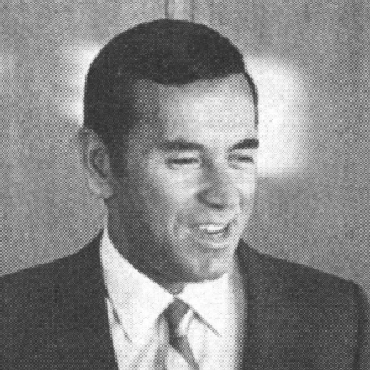 |
Delbert W. “Del” Coleman (1926-)—After selling his interest in Seeburg, Inc. (a jukebox manufacturer linked to the Outfit by the Chicago Crime Commission), the Chicago entrepreneur, an investor in Sid Korshak's Acapulco Towers, connived with Korshak to take over the Parvin-Dohrmann company as part of a master plan to buy the Stardust and other Vegas casinos. The affair ended with Coleman, Korshak, and others being rebuked by the Securities and Exchange Commission for stock manipulation. The experience also led to a permanent falling-out between Korshak and Coleman.
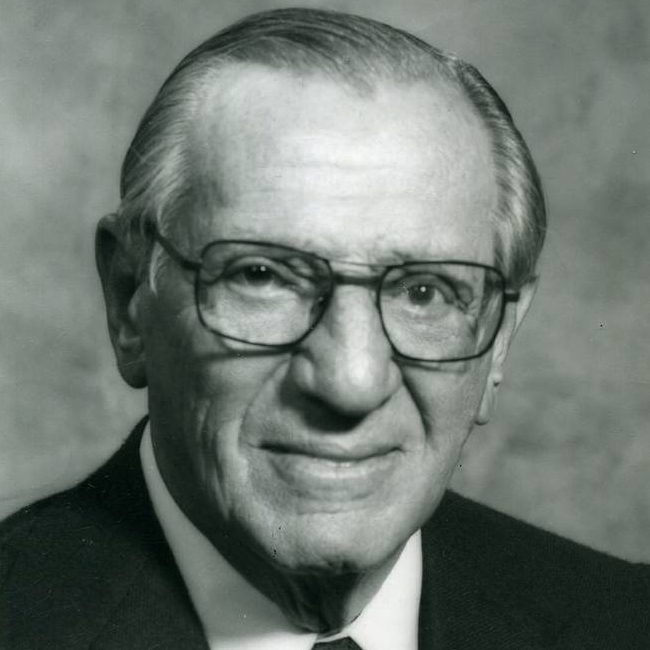 |
Morris Barney “Moe” Dalitz (né Dolitz ) (1899-1989)—aka “Moe Davis” and “The Godfather of Las Vegas.” The leader of Cleveland's May field Road Gang, where he specialized in bootlegging and gambling. Moved to Las Vegas, where he owned mob-skimmed Desert Inn, before expanding into numerous other Vegas properties, and the formerly mob-friendly La Costa Resort in Southern California. Considered Sid Korshak his legal adviser.
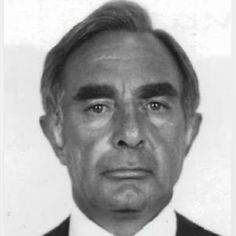 |
Allen M. Dorfman (1924-1983)—For many years, did the Outfit's (and Sid Korshak's) bidding as manager of the Teamsters Pension Fund, disbursing over $500 million in low-interest loans, especially to Chicago hoods in Las Vegas. In return, he received kickbacks on the loans, and his insurance company was named carrier of the lucrative Teamsters' Health Care Fund. Soon after his convictions on the kickbacks and the bribery of Nevada senator Howard Cannon, he was murdered in the Chicago suburbs, amid contentions that he had been “flipped” by the feds.
 |
Bob Evans (né Robert J. Shapera) (1930—)—Manhattan-born clothing salesman for his brother Charles's Evan-Picone clothing line. After a brief flirtation with acting, named by Gulf & Western chief Charles Bluhdorn as production head at Paramount Studios, which he gave a new life after producing hits such as The Godfather and Love Story. Well-known abuser of narcotics, Evans fell out with his longtime “consigliere,” Sid Korshak, after being busted in 1980 for cocaine possession, narrowly escaping a trafficking charge. It was reported that he later came under suspicion when Roy Radin, an investor in Evans's Cotton Club movie, was murdered in 1983, amid a haze of massive cocaine purchases and thefts. When the case came to trial in 1989, Evans, under the guidance of his attorney, Korshak friend Robert Shapiro, took the Fifth Amendment and refused to testify. Evans was a close friend and promoter of child rapist and director Roman Polanski. Dated (fill in the blank with starlet names). Serial husband.
 |
John Jacob Factor (1889-1984)—aka “Jake the Barber.” British stock swindler, brother of Hollywood cosmetics baron Max Factor. After hiding out in Chicago, Factor faked his own kidnapping (with the Outfit's help) to avoid extradition to the UK (sending an innocent “kidnapper” to jail for life). Later, Factor fronted for the Outfit at their Stardust Hotel in Las Vegas. In Sin City, Jake took orders from Sid Korshak, while in Los Angeles, brother Max Factor employed Korshak to keep labor in line. Noted philanthropist.
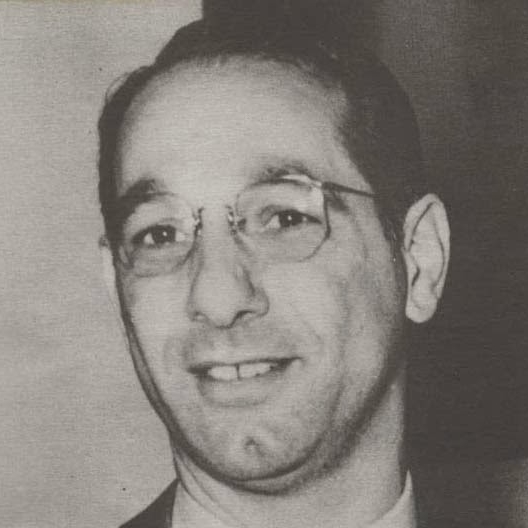 |
Charlie Gioe (né Joye) (1904-1954)—aka “Cherry Nose.” Bookie in the Capone Syndicate, co-owner of Chicago's Seneca Hotel (a key Supermob crossroads) with Alex Greenberg; convicted in the 1943 Hollywood extortion scandal, after which Sid Korshak, who had visited Gioe in prison twenty-two times, arranged for his parole supervision.
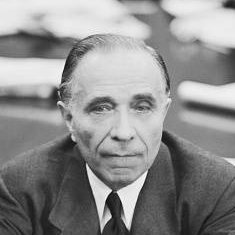 |
Alex Louis Greenberg (1891-1955)—aka “The Comptometer.” Chicago bootlegger and real estate investor for the Capone mob and the Outfit, loan shark, and part owner of the Seneca Hotel. Partnered with Paul Ziffren and others in California land investments.
 |
Al Hart (1904-1979)—Bootlegger in the Capone mob, distillery owner, backer of Bugsy Siegel in Las Vegas. After move to California, he owned the mob-friendly Del Mar Race Track and founded the mob-friendly City National Bank of Beverly Hills, later the largest independent bank in California. With Sid Korshak, an original investor in both the Bistro restaurant and Korshak's gangster getaway, The Acapulco Towers.
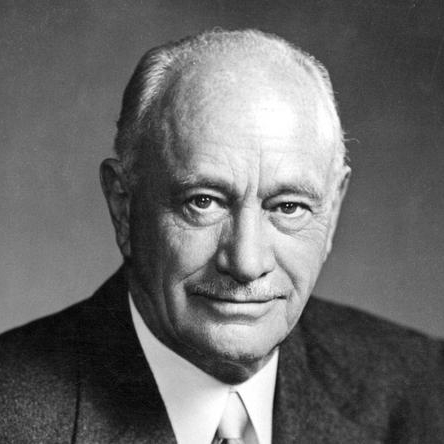 |
Conrad Hilton (1887-1979)—New Mexico-born patriarch of the Hilton Hotel dynasty, partnered with mob-front Arnold Kirkeby to expand his empire, which utilized Sid Korshak as labor consultant. Paid for his long association with Korshak when his bid to obtain a New Jersey casino license was rejected in 1985, largely due to Korshak's mob ties.
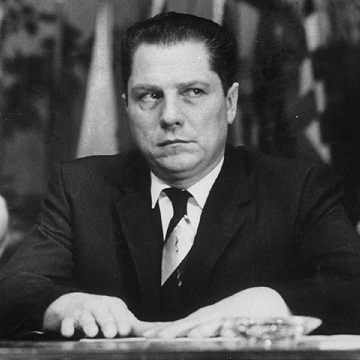 |
James Riddle “Jimmy” Hoffa (1913-1975?)—Rugged son of an Indiana coal miner who seemed predestined to head a violence-prone organization like the Teamsters, which he did from 1957 until his imprisonment for jury tampering in 1967. Hoffa was only able to attain his post thanks to the key backing of Outfit bosses such as Curly Humphreys, who had their sights fixed on the heavily endowed Pension Fund. When Hoffa allowed them Las Vegas loans, he had to answer to Sidney Korshak. Hoffa disappeared in 1975 after he announced he wanted to take back the Teamster presidency from a cabal that made Hoffa's relationship with racketeers seem benign by comparison.
 |
Howard Robard Hughes (1905-1976)—Texas-born aviation-industry pioneer, film producer, Las Vegas-hotel magnate, recluse, and best-known sufferer of obsessive-compulsive disorder. Hughes tangled (successfully) with Sid Korshak over ownership of RKO studios in the fifties and unsuccessfully with Korshak's Outfit pals in Las Vegas in the seventies.
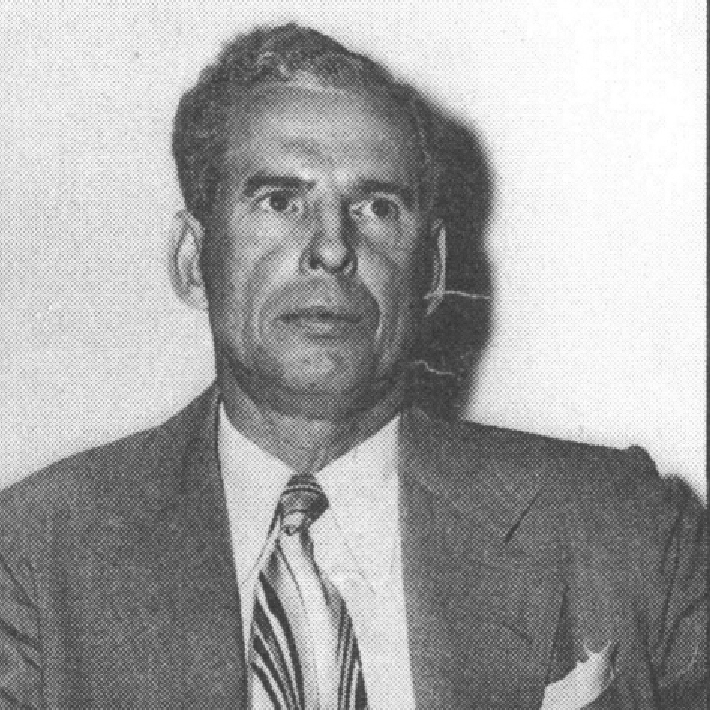 |
“Murray” Llewelyn Morris Humphreys (1899-1965) —aka “Curly,” “The Hump,” “The Camel,” “John Brunswick,” “G. Logan,” “Mr. Lincoln,” “Dave Ostrand,” “Cy Pope,” “Einstein,” “Mr. Moneybags.” Labor-racketeering, corruption, and bribery genius of the Chicago Outfit. Sidney Korshak's direct superior and liaison to “the Chicago boys” after Korshak was sent West.
 |
Burton W. Kanter (1930-2001)—Abe Pritzker's Chicago tax attorney, and a founder of the Castle Bank in the Bahamas, where the Pritzkers and other clients were able to dodge millions in taxes in the 1970s. Kanter, himself a multimillionaire, openly admitted to not paying taxes for decades. With the Pritzker dynasty, devised a kickback scheme involving Prudential Insurance and creative forms of offshore film financing used to bankroll some of Hollywood's biggest hits. At the time of his death, after a complicated ten-year IRS investigation, he was awaiting sentencing for massive tax evasion. Noted philanthropist.
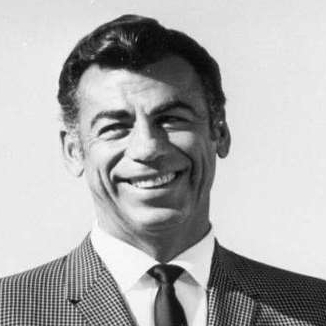 |
Kerkor “Kirk” Kerkorian (1917—)—California-born, hugely successful deal-maker and conglomerate builder. After an early profitable airline venture, he purchased MGM and numerous Las Vegas hotels, including the Hilton International, MGM Grand, The Mirage, and Mandalay Bay. In his early career, he was linked by telephone wiretaps to Genovese crime-family enforcer Charlie “the Blade” Tourine.
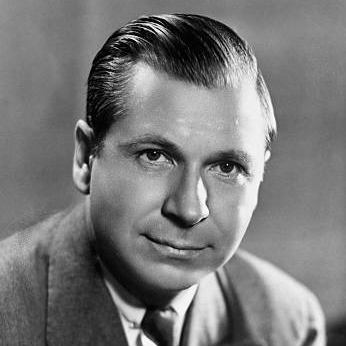 |
Arnold S. Kirkeby (1900-1962)—Chicago real estate speculator who partnered with Conrad Hilton (openly) in numerous hotels and restaurants, and with hoods such as Meyer Lansky and Longy Zwillman (covertly).
 |
Morris Jerome “Marshall” Korshak (1910-1996)—Sidney's kid brother and another Chicago-born attorney, one of the most successful elected politicians (liberal Democrat) in twentieth-century Chicago, and a lifelong supporter of the state of Israel.
 |
Sidney Roy Korshak (1907-1996)—aka “The Fixer,” “The Myth,” “Mr. Silk Stockings,” and “The Duke.” Chicago-born attorney who was the point man in the Chicago Outfit's power plays in Hollywood and Las Vegas, often conducting business from his table at the Bistro restaurant in Beverly Hills, where he had relocated in the fifties. Middleman between the mob-controlled Teamsters and legit corporations who curried its favor for labor peace. In Vegas, he was in charge of a number of hotel-casinos, most notably The Riviera. Frequent escort of actresses Jill St. John (Oppenheim) and Stella Stevens (Estelle Eggleston), among others.
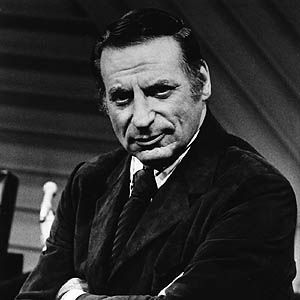 |
Irv Kupcinet (1912-2003)—aka “Kup.” Iconic Chicago Sun-Times gossip columnist and Emmy Award-winning television host. Kup was a longtime friend of Sid Korshak's, with whom he shared Table One in the Ambassador East's Pump Room. Korshak came to Kup's aid when Kup's daughter was murdered in Hollywood in 1963.
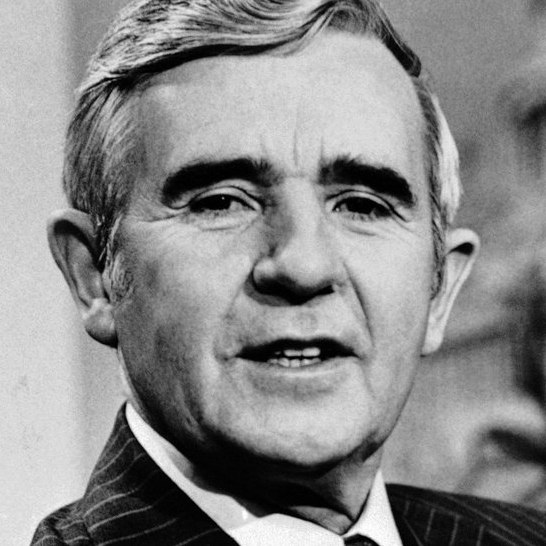 |
Paul Dominque Laxalt (1922-)—Nevada-born U.S. senator (1974-87) and governor of Nevada (1967-71). Ronald Reagan's closest pal, and his presidential campaign chairman, he was also close to his own chief fund-raiser, Ruby Kolod of Cleveland's Mayfield Road Gang, and Chicago's Sid Korshak. When Laxalt needed a loan to build his Ormsby House Casino in Carson City (soon to be skimmed by the Chicago Outfit), Korshak allegedly had him write a character reference letter on behalf of imprisoned Jimmy Hoffa to President Nixon; Korshak then set him up with a loan from a friendly Chicago banker. When these associations and allegations were reported in the Sacramento Bee, Laxalt's long-planned presidential bid was torpedoed.
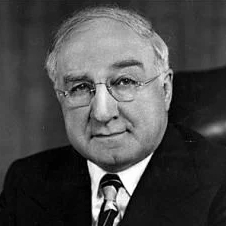 |
James Caesar Petrillo (1892-1984)—aka “Little Caesar” and “The Mussolini of Music.” Longtime Chicago president of the powerful American Federation of Musicians (AFM). Often linked to the Chicago Outfit, Petrillo gave favored-fee status to Stein's fledgling MCA, enabling it to bury the competition. Target of three congressional investigations and two federal prosecutions for union corruption.
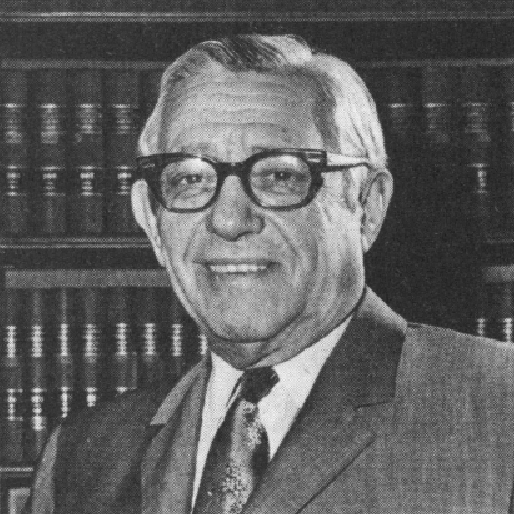 |
Abe Pritzker (1896-1986)—Chicago attorney (Pritzker, Pritzker and Clinton) and corporate mogul (Hyatt Hotel chain, the massive Marmon Group conglomerate). His firm's Stanford Clinton was a trustee of the mob's bank, aka the Teamsters Pension Fund, from which Hyatt made low-interest loans. Often linked to Chicago's Outfit, and L.A.'s “Capone,” Jack Dragna, Pritzker employed lifelong friend Sid Korshak to keep labor unions in line. His company paid penalties of $460 million for a fraudulent bank failure and millions more to the IRS for tax evasion; the Pritzker empire was the largest depositor in the offshore Bahamian Castle Bank, which was developed by Pritzker's tax attorney Burton Kanter as a vehicle for tax dodging. Noted philanthropist.
 |
Ronald Wilson Reagan (1911-2004)—aka “Dutch,” “The Gipper,” and “The Great Communicator.” Sub-B actor from Iowa, who started out in Outfit-controlled joints before being promoted by his agents, MCA's Stein and Wasserman, into the Screen Actors Guild presidency, the California governorship, and eventually the U.S. presidency. Lifelong hunter of commies, both real and imagined, and an informant on fellow actors for the FBI's J. Edgar Hoover. Told the Soviets, “Tear down this wall.”
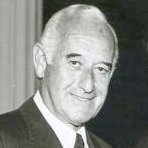 |
Harvey Silbert (1912-2002)—Chicago-born attorney; moved to L.A., where he was a partner in the powerful law firm Wyman, Bautzer, Rothman, Kuchel, Christianson, and Silbert, which represented many A-list celebrities; personal attorney for Frank Sinatra. Silbert was a stockholder in Korshak's heavily skimmed Riviera, which he managed for a time. (FBI sources alleged that Riviera skim was laundered through Silbert's law firm.) Silbert was also a director of the beleaguered Parvin-Dohrmann Corporation. Prolific philanthropist, especially to Jewish causes.
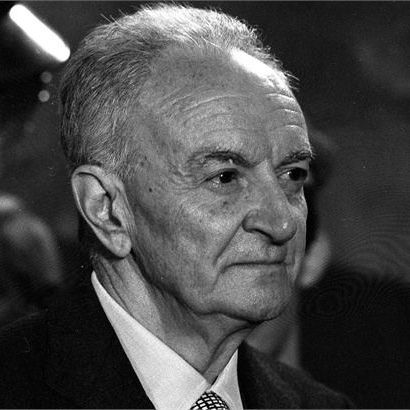 |
Michele Eugenio Sindona (1920-1986)—aka “The Shark” and “St. Peter's Banker.” Charlie Bluhdorn's Sicilian alter ego, successful industrialist, banker, conglomerate builder; also a reputed made mafioso who laundered Gambino-family heroin profits through the Vatican Bank (one of his clients), and a member of the secret Italian Masonic Lodge, known as P-2. After investing heavily in Bluhdorn's Paramount Pictures, he was convicted of bank fraud in 1980 (sentenced to twenty-five years), then extradited to Italy, where he was convicted in 1986 of ordering the murder of an Italian prosecutor who was investigating Sindona's vast Mafia entanglements. Two days after his murder conviction, Sindona died in an Italian prison, poisoned under mysterious circumstances.
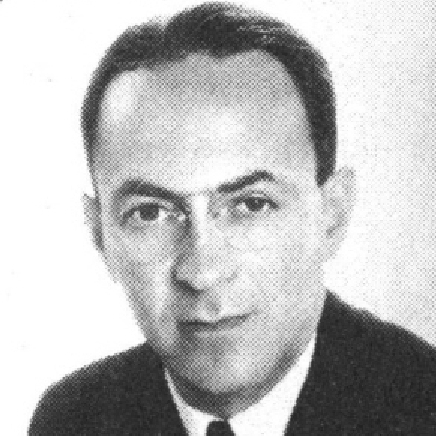 |
Dr. Julius Caesar “Jules” Stein (1896-1981)—Chicago ophthalmologist and founder of Music Corporation of America (MCA) and Universal Pictures, arguably the most powerful entertainment conglomerate in American history. Early friend of Al Capone, who helped Stein muscle his way into the business by smoke-bombing competitors. His MCA was continually investigated by the feds for six decades, with minimal repercussions. Noted philanthropist.
 |
Lester Velie (1908-2003)—Classmate of Sid Korshak's at the University of Wisconsin, preeminent award-winning investigative journalist for Collier's and Reader's Digest, a lifelong organized-crime gadfly and the first to crusade against Korshak, Ziffren, and the Supermob.
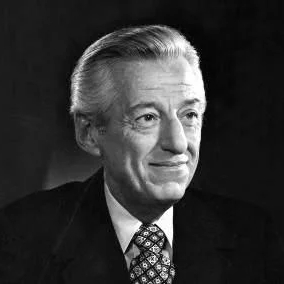 |
Louis “Lew” Wasserman (né Weiserman) (1913-2002)—MCA president who, with Jules Stein, became one of the most powerful entertainment moguls in America. Tried hard to stay out of the public eye and was known as a brilliant visionary, tough businessman, and master of corporate tax avoidance through the use of the Dutch Sandwich scheme. Heavily reliant on Sid Korshak's sway over Hollywood unions and guilds. Together with Ziffren and Korshak, known as the Three Redwoods. Wasserman was an important West Coast supporter of many Democratic presidents.
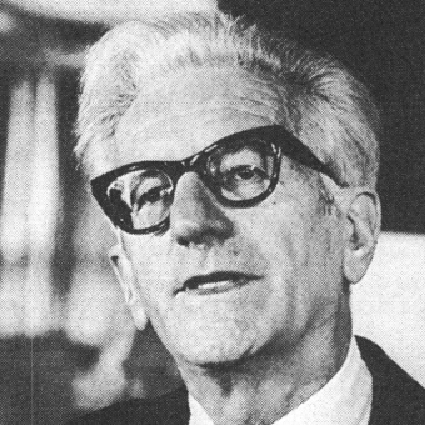 |
Paul Ziffren (1913-1991)—Chicago attorney (and possibly the illegitimate son of Jake Arvey), specializing in tax law. Frequent real estate speculator, especially in postwar California, with the likes of Alex Greenberg, David Bazelon, Fred Evans, and Sam Genis. In his twenty-year run as California's Democratic national committeeman, Ziffren became, like his mentor Arvey in Illinois, a kingmaker for the Democratic Party in California in the mid-twentieth century. Brought both the 1960 Democratic convention (which nominated JFK) and the 1984 Olympics to L.A. His prestigious L.A. law firm, Gibson, Dunn and Crutcher, which specialized in tax matters, had a large celebrity clientele.
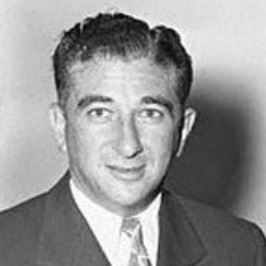 |
Abner Zwillman (1904-1959)—aka “Longy.” New Jersey's most notorious gangster, founder of Murder Inc. Among his enterprises were gambling, prostitution running, and control of labor unions. Zwillman was possibly the first big gangster to “wash” his money in so-called legit businesses such as Kirkeby's Hilton Hotels, casinos from Havana to Las Vegas, and in Hollywood movie studios, where his interests (and girlfriends such as actress Jean Harlow) were often watched over by Sid Korshak.
Su-per-mob (soo-per-mahb) n. a group of men from the Midwest, often of Russian Jewish heritage, who made fortunes in the 20th century American West in collusion with notorious members of organized crime.
TWO TYPES OF POWER dominated the twentieth century: the visible, embodied in politicians, corporate moguls, crime bosses, and law enforcement; and the invisible, concentrated in the hands of a few power brokers generally of Eastern European and Jewish immigrant heritage. Operating safely in the shadows, these men often pulled the strings of the visible power brokers. Although they remained nameless to the public, they were notorious among a smattering of enterprising investigators who, over decades, followed their brilliant, amoral, and frequently criminal careers. The late Senate investigator and author Walter Sheridan dubbed them the Supermob.
For all their power, this covert cadre of men had a surprisingly monolithic pedigree. They shared an ancestral lineage traceable from the former Russian-mandated Jewish ghetto known as the Pale of Settlement, emigrating first to the Maxwell Street-Lawndale sections of Chicago, and ultimately to what could be termed the Third Settlement, Beverly Hills, California. While they were nomadic to the degree that they followed the money, from Lake Shore Drive to the Vegas Strip to Beverly Hills, the Supermob largely succeeded in creating better, and more legitimate, lives for their offspring. In the process, they became quintessential capitalists, exerting such far flung influence that the repercussions were felt by practically every American of their era, with an economic impact that could only be measured in the trillions of dollars. Through deniable, often arm's-length associations with the roughneck Italian and Irish mobsters imprinted in the popular imagination, the Supermob and the hoods shared a sense of entitlement regarding tax free income. This “Kosher Nostra” stressed brains over brawn and evolved into a real estate powerhouse, an organized-labor autocracy, and a media empire. If power does, indeed, corrupt, then the Supermob corrupted absolutely. Through methodically nurtured political ties, the Supermob effectively insulated itself from prosecution. They were above the law.
They had names like Korshak, Arvey, Greenberg, Pritzker, and Ziffren. Within this Supermob, Jake Arvey was the visionary kingmaker, the patriarchal Chicago ward boss who inspired his own young wards—prodigies like Sid Korshak, the sphinxlike operator who quietly kept the wheels of the enterprise greased, or Alex Louis Greenberg, Paul Ziffren, and the others who plunged into stealthy entrepreneurships that made up the engine of this hidden economy. Although they propelled the making of the movies we watched, the music we listened to, the politicians we voted for, and the hotels and resorts we frequented, it is a testament to their genius that most Americans never heard of any of them.
|
Contents
|
|
| Chapter 1 Chapter 2 Chapter 3 Chapter 4 Chapter 5 Chapter 6 Chapter 7 Chapter 8 Chapter 9 Chapter 10 Chapter 11 Chapter 12 Chapter 13 Chapter 14 Chapter 15 Chapter 16 Chapter 17 Chapter 18 Chapter 19 Chapter 20 Chapter 21 Chapter 22 |
Cast of Characters … ii Preface … iii The Lawyer from Lawndale … 1 From Lawndale to the Seneca … to the Underworld … 7 Birds of a Feather … 13 Kaddish for California … 19 The Future Is in Real Estate … 24 “Hell, That's What You Had to Do in Those Days to Get By” … 30 Scenes from Hollywood, Part One … 36 Jimmy, Bobby, and Sidney … 40 Forty Years in the Desert … 45 The Kingmakers: Paul, Lew, and Ronnie in California … 51 The New Frontier … 57 Bistro Days … 64 “He Could Never Walk Away from Those People” … 68 Scenes from Hollywood, Part Two … 74 “A Sunny Place for Shady People” … 77 Coming Under Attack … 81 From Hoffa to Hollywood … 84 From Dutch Sandwiches to Dutch Reagan … 91 Airing Dirty Laundry and Laundering Dirty Money … 96 Pursued by the Fourth Estate … 102 The True Untouchables … 108 Legacies … 115 Appendix A … 119 Appendix B … 120 Appendix C … 127 Bibliography … 128 |
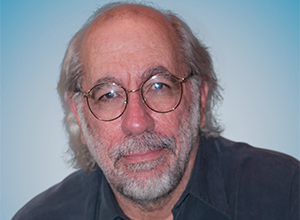 |
Gus Russo is the author of The Outfit: The Role of Chicago's Underworld in the Shaping of Modern America and Live by the Sword: The Secret War Against Castro and the Death of JFK. He is an investigative reporter who has worked for various major television networks, including PBS, where he was a lead reporter for the award-winning Frontline series.
“Russo does a masterful job of establishing the ethnic and political foundations for Korshak's beginnings. The amount of research in the book is staggering. It's a testament to Russo's doggedness to bring the full story to light.” — Chicago Sun-Times
“Blockbuster.” — Chicago Jewish News
“Seymour Hersh, Nick Tosches and Brian Ross did early spadework, but no one has dug so deeply into ‘The Fixer’ as Gus Russo does.” — New York Daily News
“Engaging … an absorbing secret history of [the] American 20th century.” — Onion
“There are plenty of revelations in this absorbing book.” — Kirkus Reviews
“Korshak lived the kind of riveting life that's ripe for fiction … a brilliantly researched book.” — Forward
“Veteran investigative author and organized crime expert Russo's magnum opus is a compelling look at one of the last century's major power players. Russo's extensive research is amply evident, and he has made use of recently disclosed records to paint a fuller picture than predecessors such as Seymour Hersh and Brian Ross were able to … a worthy addition to the genre.” — Publishers Weekly
“Truth lives in the shadows of history, and Gus Russo takes us into those shadows with his fascinating and frightening book Supermob.” — James Grady, investigative reporter for Jack Anderson and author of Six Days of the Condor
“Gus Russo, through some remarkable investigative journalism, has uncovered a dark side of American history—especially in California: from the 1940s to the 1980s, an almost untouchable group of exceedingly influential men wielded their enormous business and political power, sometimes criminally, to achieve their ends. The villainy explored in Supermob has always been suggested, but to my knowledge never nailed down and written about in a riveting book. Highly recommended.” — Vincent Bugliosi, former Los Angeles County lead prosecutor and author of Helter Skelter
“By exposing America's Supermob, Gus Russo has done what Congress and the Department of Justice should have done more comprehensively years ago. As a former federal investigator, I tip my hat to Russo for this exhaustive and compelling addition to the canon of seminal books on organized crime in America. Sidney Korshak, the ultimate mob lawyer and fixer, and some of his ilk are invisible no more.” — Philip Manuel, former chief investigator, U.S. Senate Subcommittee on Investigations, and member of the President's Commission on Organized Crime.
“Supermob confirms what we in law enforcement have long known, but were prevented from pursuing: the longstanding relationship between the mob and ‘legitimate’ politicians and corporate leaders. This is a must-read for the average citizen who wants to know how organized crime has really impacted their lives. Gus Russo has written perhaps the most long-overdue book on crime in American society.” — Robert Fuesel, former special agent, IRS Organized Crime Division, and former executive director of the Chicago Crime Commission.
“Nearly all of us who have written about the underworld's penetration of legitimate institutions have given considerable thought to authoring a book about Sidney Korshak. However, it took the courageous Gus Russo, with his groundbreaking research and his fabulous rock ‘n’ roll writing style, to accomplish that landmark feat. Simply speaking, Supermob is a grand-slam home run.” — Dan E. Moldea, author of Dark Victory: Ronald Reagan, MCA, and the Mob
“Long one of our preeminent investigative journalists, Gus Russo here extends his unrivaled research into organized crime into a full-blast biography of Sidney Korshak, the suave mob lawyer behind decades of show business and California politics. This fascinating study of the powerhouse second generation of Chicago Russian Jews headed toward Beverly Hills is sociology with shark's teeth in its head, very original and very important.” — Burton Hersh, Fulbright scholar and author of The Old Boys and The Mellon Family
“Gus Russo is America's bravest and most respected investigative author, specializing in the underworld's hidden ties to the upperworld. Russo's chilling portrait of Supermob lawyer Sidney Korshak is his finest work in a brilliant career.” — Richard J. Whalen, author of The Founding Father: The Story of Joseph R Kennedy.
SUPERMOB:
How Sidney Korshak and His
Criminal Associates Became
America's Hidden Power Brokers
Gus Russo
BLOOMSBURY
Copyright © 2006 by Gus Russo
All rights reserved. No part of this book may be used or reproduced in any manner whatsoever without written permission from the publisher except in the case of brief quotations embodied in critical articles or reviews. For information address Bloomsbury USA, 175 Fifth Avenue, New York, NY 10010.
Published by Bloomsbury USA, New York
Distributed to the trade by Holtzbrinck Publishers
All papers used by Bloomsbury USA are natural, recyclable products made from wood grown in well-managed forests. The manufacturing processes conform to the environmental regulations of the country of origin.
Library of Congress Cataloging-in-Publication Data
Russo, Gus.
Supermob : how Sidney Korshak and his criminal associates became America's hidden power brokers / Gus Russo.— 1st U.S. ed.
p. cm.
Includes bibliographical references and index.
ISBN-13: 978-1-58234-389-1
ISBN-10: 1-58234-389-6
1. Korshak, Sidney Roy, 1907-1996. 2. Lawyers—Illinois—Chicago—Biography. 3. Lawyers—California—Biography. 4. Organized crime—United States. I. Title.
KF373.K67R87 2006
364.1092—dc22
[B]
2006015747
First U.S. Edition 2006
1 0 9 8 7 6 5 4 3 2 1
Typeset by Westchester Book Group
Printed in the United States of America by Quebecor World Fairfield